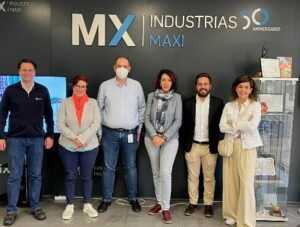DETECTA PROJECT PRESENTS A PREDICTIVE MAINTENANCE AND CYBER-SECURITY MODEL FOR INDUSTRIAL SYSTEMS
Posted on: , by :
Detecta has relied on artificial intelligence, the digital twin and black box environments to create a working environment that can predict both physical incidents and cyber-attacks.
Industry 4.0 has accelerated the digitization of productive operations, fostering a remarkable increase in productivity to serve the decentralized economy of the post-covid era. This paradigm shift towards hyper-connected systems has put the maintenance function and the sustainability of manufacturing processes to the test with new risks, not only of asset provisioning, reliability and maintainability of a wide variety of process technologies, but also of cybersecurity risks associated with the convergence of Information Technology and Operational Technologies (IT/OT).
In response to this new paradigm, the Detecta consortium, formed by two clusters (AEI Ciberseguridad and FACYL), two technological centers (Cidaut and Funditec) and an industrial company (Industrias Maxi) has set itself the objective of generating predictive knowledge to cover the need to characterize heterogeneous industrial processes, including the machinery involved, in order to allow an early detection of technical anomalies so as not to limit productivity in the industrial plant, to have permanent information available and to achieve a discrimination of anomalies between purely technical events and events related to cyber-incidents.
To carry out the project it was necessary to establish a laboratory environment, set on a real machining machine, in this case at Maxi Industries. During the investigation, three indicators considered representative of the process were chosen: temperature, current and acceleration, and a characterization of the process was created based on both the work of the machine operators, maintenance work, and remote assistance that may be required.
Based on this characterization, data began to be recorded, resulting in a history in which, by applying Artificial Intelligence algorithms, patterns can be identified and possible behavioral anomalies and their causes can be predicted. It is a methodology divided into two parts: on the one hand, the data treatment (processed, treated, classified, etc.), and on the other hand, the development of the Artificial Intelligence model itself which, from that classified part, is trained and validated, counting on the observations of the expert of Maxi Industries, indicating, for example, if the process has been normal or if some conditioning factor has intervened.
All this process has been carried out in a short time: during 88 days about 7 million records have been taken, remaining after processing at 1 million records, being these the ones used for training and validation of the models.
The results obtained coincide with the values that are very similar to those established as limit criteria by the expert, which indicates that the model is using the variables correctly and establishes good thresholds, therefore, it is reliable.
At the end of the project, a platform has been obtained through which the expert is alerted that there has been an incident, and the operator must intervene to review it and act in a timely manner. Currently, the system continues its learning process and detects some “false alerts”, which, in the words of José Félix Ovejero, head of manufacturing and IT at Industrias Maxi, “we are talking about systems that are tremendously expensive and that must have high availability; I prefer to receive a false alert before a real failure goes unnoticed. It’s a matter of training the system to learn to separate what is good and what is not.
Conclusions
With the approach carried out during the project, a dataset of machine records supervised by operators and process experts has been obtained; anomalies corresponding to machining programs have been identified, it has been possible to have this history, analyze it, look for patterns and start to predict possible behavioral anomalies, in a time of less than four months.
Looking to the future, this research means that a company that keeps a regular record of data can obtain a characterization of a process that provides results with a very interesting reliability from the point of view of learning supervised by the operator; which is important for small companies because it does not require a large investment or a long start-up time, one of the most common barriers to the implementation of this type of process.
Read the article published in the Innovadores supplement of El Mundo.
It is a project funded by the Ministry of Industry, Tourism and Trade, carried out by the entities AEI Ciberseguridad, FACYL, Cidaut, Funditec and Industrias Maxi.
